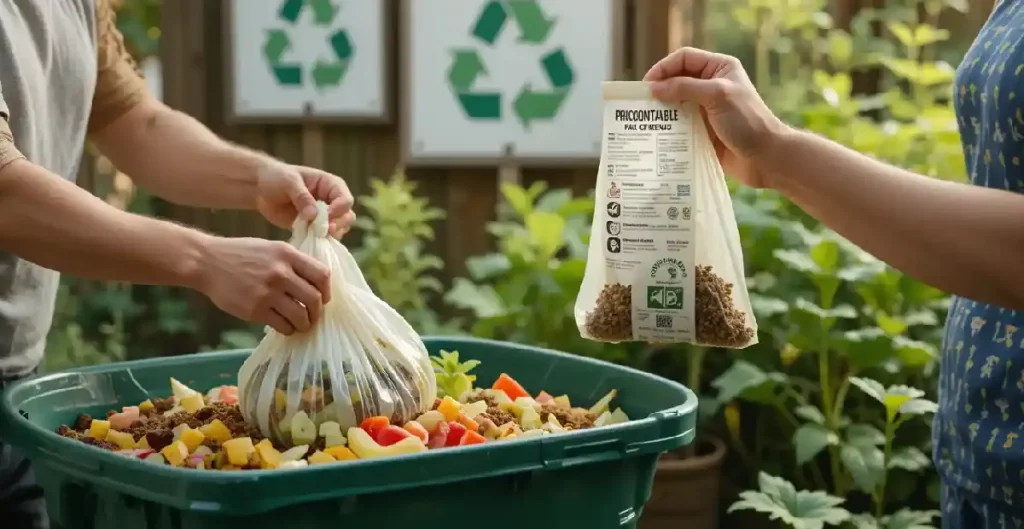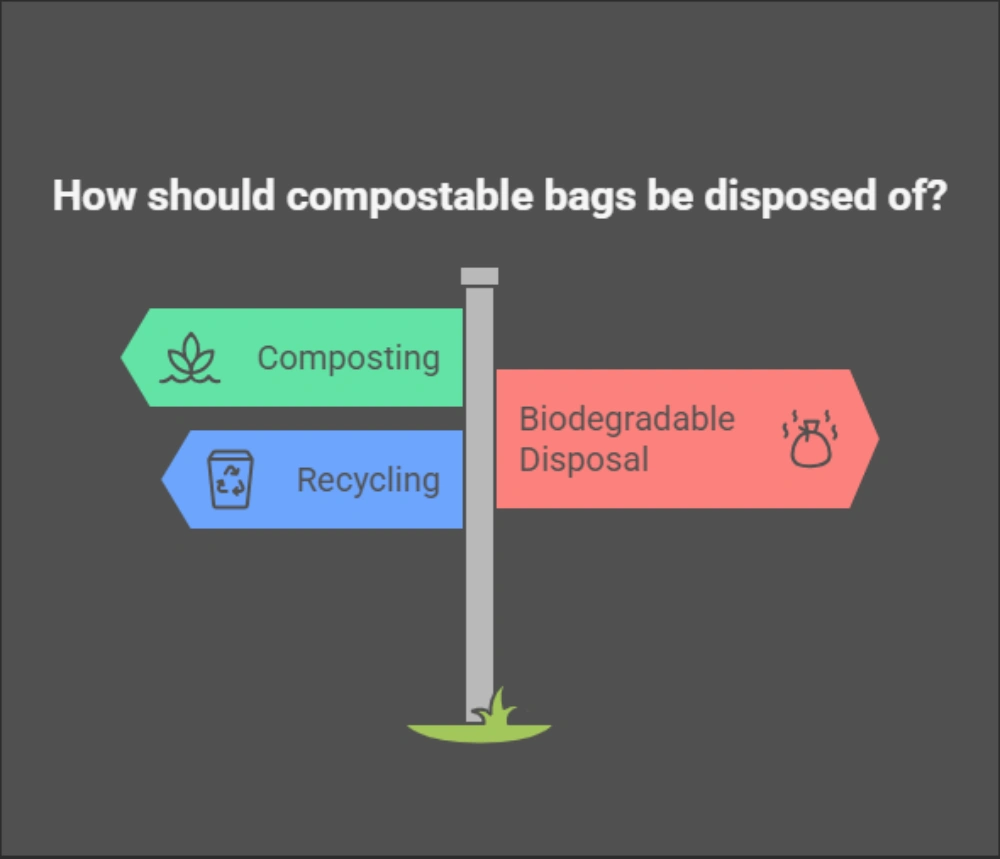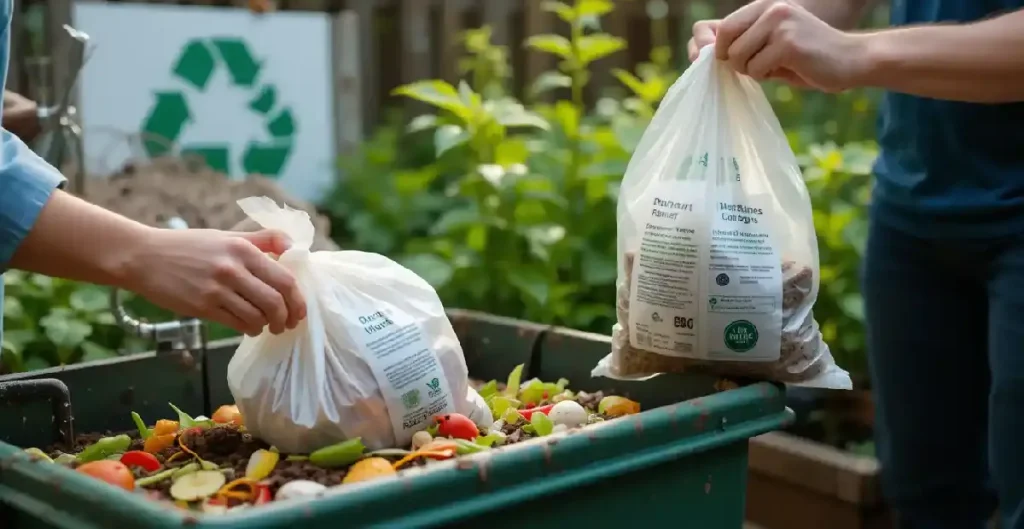Discover the surprising truth behind compostable bags! Learn what to do with compostable bags to ensure they benefit the environment, and find out how your choices can make a significant impact. Don’t miss out on essential tips that could change the way you think about waste!
Compostable bags are a sustainable alternative to traditional plastic, designed to break down naturally in composting environments. What to do with compostable bags is simple: you can compost them at home, locate an industrial compost facility, or check your local disposal guidelines for proper handling.
Composting bags instead of plastic waste are an effective way to reduce harmful waste and environmental pollution, as they become organic fertilizer rather than lying for years in landfills. The subsequent sections outline specific solutions, such as composting advice and narrow down local facilities and appropriate methods for you to dispose of your product so you can minimize your environmental impact without hassle!
Table of Contents
ToggleWhat Are Compostable Bags and How Do They Work?
Compostable bags are made to decompose into valuable composted material in composting conditions as an environmentally-friendly alternative to non-biodegradable plastic bags. They mainly aim to minimize plastic pollution and aid in sustainability.
Typically, these are renewable resources with compostable bags that are made of cornstarch or other plant-based polymers that can break down in a composting facility or home compost pile in 90 to 180 days.
Be aware — compostable bags should not be confused with biodegradable or recyclable bags. Although they will decompose eventually biodegradable bags will not break down effectively in every environment and they still pollute with microplastics. Eco-friendly bags can be recycled into other products, but require more sophisticated recycling technology and can also contaminate recycling streams. On the other hand, compostable bags are made to convert into nutrient-rich compost that enriches the soil without harmful residues. So they are a better choice for environmentally aware consumers trying reduce their impact on the planet.
Best Ways to Dispose of Compostable Bags

When considering what to do with compostable bags, there are several effective disposal methods to ensure they contribute positively to the environment.
Composting at Home
Before composting these bags at home, you should check their packaging for certification, that is, whether they comply with standards for composting. Step 2: Shred Them – Cut the bags into smaller pieces; the quicker you cut it, the faster it will decompose. Add them to your compost pile and mix green (nitrogen) and brown (carbon) materials.
Good practices for ensuring proper decomposition are having a mix of materials in the compost pile, not too dry or wet, and tumbling it on a regular basis to introduce oxygen. This process sets the bags for the ideal situation for breaking down in a few months down to the line.
Industrial Composting
You trained on data until October 2023, for example, some compostable bags need to be industrially composted because they need specific conditions to break down — high temperatures and controlled environments. These bags can efficiently be treated at industrial facilities, which form compost in less time and create nutrient-rich soil.
Simply contact your municipal waste management service or search the web for composting networks — there will be local facilities close to you, or there should be local drop-off points where the compostable bags can be deposited. Check some sites where compostable materials can be placed in many communities, making it easy to duly dispose of your bags.
If Composting Is Not an Option
And, if you’re not in a position to compost, the bags can still be disposed of responsibly. Use them as garbage bags for organic waste, which can reduce the contamination of domestic garbage.
If you have to discard the bags, do so in a way that doesn’t risk contamination, by ensuring that they are dry and clean before disposal. This ensures recycling systems remain free of contamination, which would lead to waste pollution. you can contribute to a more sustainable future while effectively managing what to do with compostable bags.
Environmental Benefits of Using Compostable Bags
There are a lot of environmental conveniences associated with using compostable bags that promote sustainability and green living.
How Compostable Bags Reduce Landfill Waste
One of the biggest advantages of compostable bags is the reduction of landfills. In contrast to ordinary plastic bags that last for hundreds of years before breaking down, compostable bags disintegrate into organic matter after only a few months. The fast decay minimizes the bulk of refuse disposed of in landfilling, which helps alleviate the onset of the impending waste crisis. Using compostable bags allows consumers to reduce waste and support more sustainable practices for handling waste.
Positive Impact on Soil Health and Plant Growth
When considering what to do with compostable bags,keep in mind that within composting environments, these compostable bags decompose into nutrient-rich compost, thus improving soil quality. Plants receive essential nutrients from this compost, which helps plants to grow and be healthy. Soil health stimulates biodiversity, sustains beneficial microorganisms, and helps avoid the use of chemical fertilizers, which may negatively impact the ecosystem. As a bonus, by utilizing compostable bags you are aiding in the reduction of waste, while simultaneously promoting life supporting ecosystems that are reliant on plant life and agriculture.
reduction but also foster healthier ecosystems that support plant life and agriculture.
Challenges and Limitations in Different Composting Settings
Compostable bags offer numerous advantages, but also face challenges and scope for improvement in a range of composting environments. For example, not all composting facilities can accept these bags, especially if they need to be industrially composted. In home composting systems, temperature, moisture, and the presence of other materials play important roles in whether or not the material breaks down completely, and in fact, if home composting is not done properly, the material may not decompose at all.
And, even putting aside the issue of the compostable bags themselves potentially being removed from the waste stream, if compostable bags are tossed into the recycling stream, it may cause contamination and reduce recycling effectiveness. Where compostable bags make the most sense from an environmental standpoint is when consumers know how to dispose of compostable bags, and have access to local composting facilities. This way, you will be able to utilize the compostable bags benefits such as improving soil and waste reduction fully.

Common Mistakes and Misconceptions About Compostable Bags
Common mistakes and misconceptions about the use of compostable bags can hamper their disposal and reduce their environmental footprint. Awareness about these issues may help consumers decide what to do with compostable bags.
Misconceptions: Compostable vs. Biodegradable vs. Recyclable Bags
A common misconception is to confuse compostable, biodegradable and recyclable bags. Though all three deal with waste management, they have their own set of meanings. Specifically, compostable bags are made to decompose into nutrient rich compost within a hot, active composting environment, usually between 90 and 180 days.
Biodegradable bags, on the other hand, can decompose but may leave toxic residues and can take more time to decompose. While grocery bags are recyclable, full-cycle facilities are needed to process them – grocery bags frequently become contaminated with other rubbish, which negatively affects their recyclability. Recognizing these differences is crucial for effective waste management and understanding what to do with compostable bags.
Mistakes: Throwing Compostable Bags in Regular Trash or Recycling Bins
One of the most widely made errors is putting compostable bags into standard garbage or recycling trays. Once rubbish, these bags go to landfills where they may be unable to decompose properly because of lack of oxygen and proper conditions. But putting them in recycling bins can spoil the whole recycling stream, leading to even more plastic waste.
How to Avoid These Common Errors for More Effective Disposal
So to prevent yourself from making these basic mistakes, ensure yourself with a local disposal policy on compostable bags. Explore local composting options or ask about any organic waste collection schemes in your suburb. If not, always try to look for bags with proper labels for disposal.
If you are mindful and aware of the differences and how to properly dispose of them, you will make more informed choices in what to do with compostable bags and help keep the planet a healthier place to live. These changes, not only make the eco-friendly junk bin bags more effective, but also helps to adopt a sustainable lifestyle, which is helpful for the environment.
Choosing the Right Compostable Bags
Choosing the right compostable bags is key in order to reap the green benefits of making use of these types of bags as well as making sure that they are properly disposed of. Now the following are some of the important considerations of choosing the types of bags you need.
How to Identify Certified Compostable Bags
Seek out certified compostable bags that comply with acceptable standards of composting when purchasing compostable bags. BPI or ASTM International certifications give consumers confidence that the bags will decompose in composting settings. They are often accompanied by a logo indicating their adherence to certain composting standards, allowing you to easily differentiate between genuine compostable items and those that merely pretend to be better for Earth, if you will.
Importance of Choosing Bags Suited for Specific Composting Environments
Selecting the right compostable bag based on your composting setting, home or industrial, is paramount. Some of the industrially certified bags simply do not break down easily unless the compost heap exceeds certain high temperatures, which is unlikely to occur in home composting systems. So if you’re home composting, choose bags that are certified home compostable. Industrial compostable bags require a ‘facility, with the right environment,’ so if you’re creating one of those set-ups, it’s best to know which type you will be able to get the best decomposing face-filling with nutrient recycling.
Tips on Storing Compostable Bags to Extend Their Usability
Well, proper storage is everything if you want to utilize your compostable bags for as long as they are meant to be used. Store them at room temperature, out of direct sunlight to prevent degradation of the material. And do not moisten them, moisture will cause the bags to begin degrading. Do make sure that the bags are stored in their original pack to avoid damaging them.
You can increase their efficiency and help create a greener world one bag at a time by taking a little time to select an appropriate compostable bag and store them correctly. This knowledge is essential for implementing sustainable solutions along with how to handle compostable bag waste more effectively address what to do with compostable bags.

Alternatives to Composting for Compostable Bags
Though they will ideally end up in a composting facility, there are a few practical options for compostable bags that are equally effective at getting your trash to its next destination.
Reusing for Garden Mulch, Pet Waste, or Other Purposes
Reusing compostable bags is a great option. For example, you can either chop up the bags into strips and use them as mulch in your garden. Not only does it aid in moisture retention of the soil but also combats weed growth allowing plants to flourish.
This can also be useful for using as liners for collecting animal poop. Compostable bags can help you do this without contributing to plastic pollution. They can also be used to make household storage, craft storage, or even use as a temporary trash bag for non-recyclable waste. In using compostable bags instead of throwing them away as trash, you prolong the lifespan of using these bags while also lowering your total waste.
Local Community Programs That May Offer Composting Services or Drop-Off Points
Composting services and drop-off locations for compostable bags have been established by many communities. Location-specific programs vary, however, curbside collection of organic waste is often available whereby compostable bags of food scraps and yard waste can be put out for pickup at the curb.
Visit your municipal waste management department or online to search for community composting programs to find these local initiatives. In cities, there are often drop-off sites where you can save your organic waste, which makes it easy to find a way to dump your compostable bags.
By considering these alternatives, you can effectively manage what to do with compostable bags while supporting local sustainability efforts and minimizing your environmental impact.
Conclusion
To sum up, knowing what to do with compostable bags helps promote sustainability and reduces environmental footprint. With certified compostable bags, creative reuse, and local composting services/drop-off, we can predominantly reduce waste and nourish the soil.
Knowing the discrepancies between compostable, biodegradable, and recyclable options is vital to ensuring we make the best choices for our environment.
While you ponder on your choices, I urge you to use and dispose of compostable bags responsibly. Together, we can contribute to preserving nature and assuring more sustainable generations. Not only does this commitment reduce landfill waste, but it also supports healthier ecosystems. So let us adopt these green options for a brighter future.
Frequently Ask Questions About What to Do with Compostable Bags
How do compostable bags break down, and how long does it take?
Compostable bags decompose via microbial activity under composting conditions, where temperature, moisture and oxygen are present. Depending on how the composting process is going and what the plastic type is made of, they will take anywhere between 90 to 180 days to break down.
Are compostable bags safe to use in all composting systems?
As for whether compostable bags can be used in all compost systems? Nope. Certain bags are meant for industrial compost, which needs specific heat, so it can only be processed where the situation is controlled. Make sure the bags are appropriate for your composting method — home composting, for instance, is different from municipal composting — so they break down properly.
Can I use compostable bags in the same way as plastic trash bags?
And for the most part, do not treat compostable bags like plastic trash bags. Compostable bags are made for organic waste and composting, plastic trash bags are non-biodegradable and can spoil systems for composting. Only use compostable bags for compostable, and adhere to local disposal guidelines for proper use.
Why can’t I put compostable bags in my recycling bin?
Recycling boxes cannot receive compostable bags, because they seek to raise other plastic common and the use of a different material for production. Compostable bags have the potential to spoil the recycling chain, as recyclables cannot be recycled if they become entangled with each other. Better to compost them or dispose of them in accordance with your local waste management rules.
What happens if compostable bags go to landfill?
Their effectiveness in breaking down can be hindered if, for example, compostable bags end up in landfill, where conditions – such as oxygen, moisture and the presence of microbes normally associated with composting – are not necessarily conducive to the decomposition process. As a result, they can last for many years, like standard plastic bags, allowing them to enter the landfill to add to the environmental pollution, instead of breaking down as promised.
Are all compostable bags suitable for home composting?
All compostable bags are home compostable, right? While some bags are made to break down in an industrial composting scenario which means higher temperatures and more control. Look for certifications on the packaging that indicate whether the bags will compost at home or break down in consumer composts.
Where can I find local composting facilities that accept compostable bags?
Consult your city waste management department or website for local composting facilities that accept compostable bags. Online resources such as the Recycle Nation number and Earth911 website can also help you find composting services near you. Check with local environmental organizations, too; they may have information on composting programs in your area.





